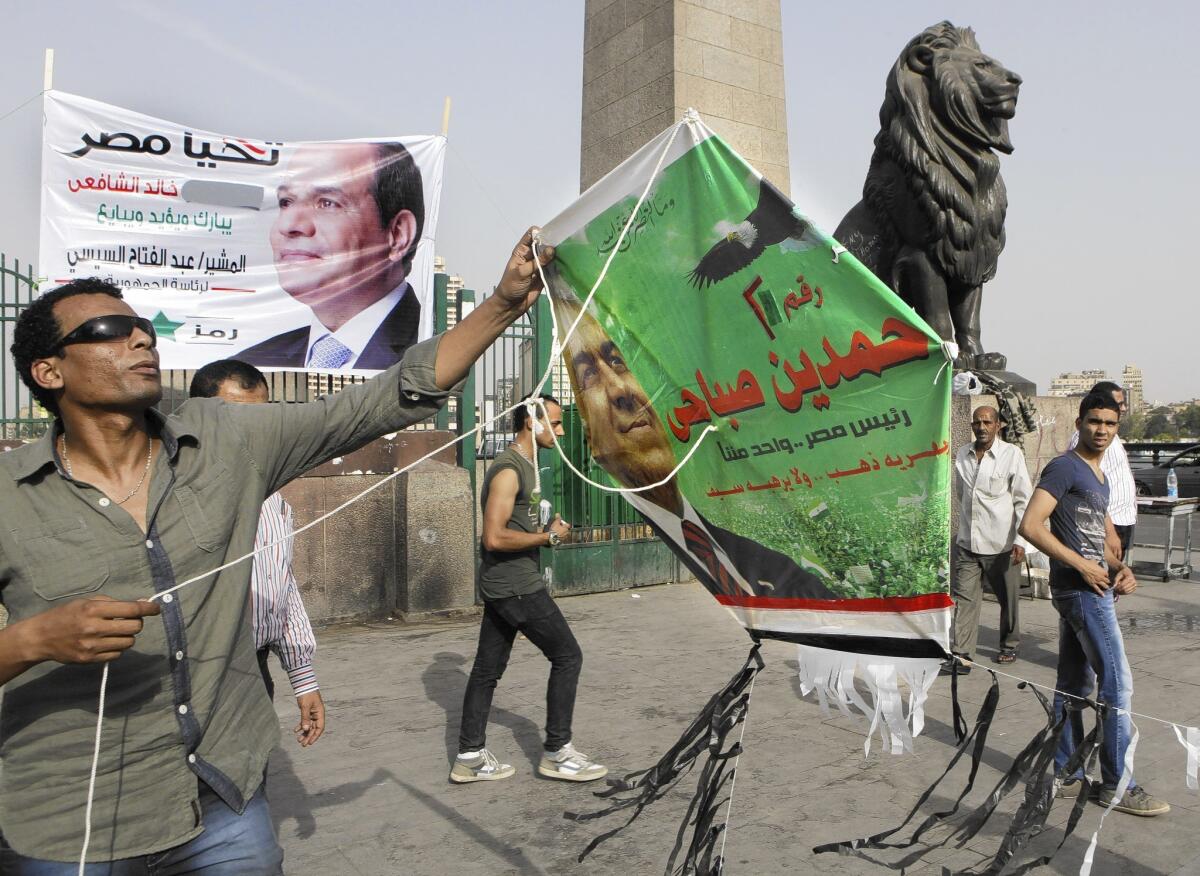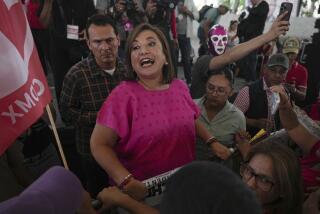Egypt, international groups weigh value of observers for election

- Share via
Reporting from Cairo — Egypt’s presidential vote next week presents a quandary for both international observer groups and the military-backed interim government.
To Egyptian authorities, the mere presence of prestigious outside observers gives the balloting a much-desired stamp of legitimacy, even in the face of the government’s harsh crackdown on political dissent.
But international election monitors’ reports will probably include yet more high-profile criticism of the repressive political climate that has prevailed in the more than 10 months since the government — whose de facto head, Abdel Fattah Sisi, is expected to be elected president — took power.
For the observer groups, the dilemma is whether to risk appearing to support what human rights groups describe as a deeply undemocratic administration by being here at all for the vote — or to stay away and perhaps let their voices go unheard.
Previous prosecutions of foreign organizations seeking to promote democracy in Egypt — including some court convictions that still stand — have kept away some authoritative groups that would normally try to assess the fairness of a major election.
Some strongly worded reservations in advance of the vote came from the U.S.-based Carter Center, which expressed concern last week about the “restrictive political and legal context” surrounding the vote.
In the last 10 months, the interim government has carried out a sweeping crackdown on Islamist opponents, but also has targeted some secular democrats. More than 1,400 supporters of deposed President Mohamed Morsi have been killed, and by conservative estimates, more than 16,000 have been arrested. Morsi, an Islamist, is imprisoned and on trial for various capital crimes.
“I am gravely concerned that Egypt’s democratic transition has faltered,” former President Carter said in a statement last week. “Egypt’s next president should take immediate steps to foster dialogue and political accommodation to ensure the full spectrum of Egyptian society can participate meaningfully in politics.”
The Carter Center chose to deploy what it called a “small expert mission” to assess conditions surrounding the electoral process.
The European Union said Monday that its observers — after reporting initial technical problems that could have seriously hampered their work — would fully participate in assessing the fairness of the balloting, deploying across Egypt.
Mario David, a member of the European Parliament and the chief observer, said Monday that the mission would go ahead despite observers not getting into the field throughout Egypt well ahead of time as intended.
“Thanks to joint efforts and the constructive engagement of the Egyptian authorities, I am pleased to announce that the [observer mission] is able to continue to observe the presidential election in Egypt as widely as possible throughout the country,” David said during a news conference in Cairo on Monday.
Many of the international organizations that monitored the 2012 election that brought Morsi to power are sitting out this balloting, as they did the January referendum on Egypt’s new constitution. Morsi was the country’s first democratically elected president, though his rule was considered profoundly authoritarian and not politically inclusive.
January’s referendum was the interim government’s first foray into a promised democratic transition. The new national charter won about 98% approval — a lopsided margin reminiscent of sham elections that were a hallmark of the three-decade rule of dictator Hosni Mubarak, who was toppled in the “Arab Spring” uprising of 2011.
Morsi was ousted by the military in July after massive popular protests demanding his removal. In the interim, the government that supplanted him has alternated between harsh demands that the international community back off and appeals for understanding of the political circumstances that led to the coup.
Hassan is a special correspondent.
More to Read
Sign up for Essential California
The most important California stories and recommendations in your inbox every morning.
You may occasionally receive promotional content from the Los Angeles Times.













